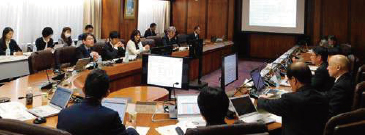With the representative director and president responsible for execution, two projects (Materiality and Climate change scenarios) were working concurrently from September 2019 and June 2020. We conducted repeated considerations while linking information from both parties.
The project to formulate the materiality was led by the executive officer who is the general manager of Strategic Planning, and was examined by members of the Board of Directors and all corporate officers, including executive officers.
The climate change scenario project was led by the executive officer who is the director, and who serves as the managing director in charge of the environment. This was done according to advice from experts and the framework recommended by the TCFD. The reviews themselves were conducted mainly with Technology Management staffers in charge of the environment, as well as each Group company’s Strategic Planning department and the managers undertaking environment-related activities.
●Relationship between Materiality and Long-term Management Goals toward 2030

●Materiality Formulation and Climate Change Scenario Examination Project Grand Schedule

Since our business domain is food provision, we are aware of our tremendous social responsibility, being involved, as we are, with many stakeholders and impacting their lives and society at large. For this reason, we have identified stakeholders based on the size of their demand and the degree of impact we have on society.
After identifying our stakeholders, we delineated social issues from future and global perspectives.
We then evaluated the importance of those social issues, based on the fact that proactive measures result in business growth, and reactive ones are focused on minimizing damage to corporate value.
We mapped material matters that would require proactive and reactive steps, and in November 2019 we held initial deliberations on the details of mapping during the Nichirei Group Strategy Committee meeting, at which we usually discuss overall management strategies.

We created separate drafts for those issues that would require a proactive or reactive approach.
In December 2019, outside experts evaluated the validity of the drafts under consideration and exchanged opinions with Company corporate officers, including the president.
|
Keisuke Takegahara Development Bank of Japan Inc. |
Hidemi Tomita Lloyd's Register Japan K.K. |
Yumiko Murakami Organisation for Economic Co-operation and Development (OECD) |
|
Kunio Otani Representative |
Kenya Okushi Representative Director, President |
Takumi Taguchi Director, Executive Officer, in charge of Nichirei Group planning and management division |
|
Yoshifumi Kaneko Director, Executive Officer; |
Junji Kawasaki Director, Executive Officer, in charge of Nichirei Group technology management and quality assurance |
Masahiko Takenaga Director, Executive Officer; Representative Director, President, Nichirei Foods Inc. |
|
Kazuhiko Umezawa Director, Executive Officer; Representative Director, President, Nichirei Logistics Group Inc. |
Masato Takenaga Executive Officer; Representative Director, President, Nichirei Biosciences Inc. |
Kazunori Miki (facilitator) Executive Officer General Manager, Strategic Planning |

Opinions of outside experts
Based on opinions received from experts, we integrated and narrowed down material matters as proactive or reactive.
In February 2020, at the second Group Strategy Committee meeting, after repeated deliberation on both the evaluation of validity by experts and opinions on distinctive Nichirei features, an agreement was reached, resulting in a draft containing five material matters.

In June 2020, five material matters were designated by the Board of Directors chaired by the Representative Director, Chairman. Nichirei has set long-term Group goals for climate change initiatives, and will continue to consider long-term goals (measures and KPIs) for the other four material matters.
We are discussing the five material matters with Group companies and will incorporate them into each of their business strategies through the formulation of an organizational profile.
| Material matter | Ideas inherent in the materiality |
|---|---|
| Creating value in food and health | In Japan—which constitutes Nichirei’s main market—changes are expected in the future, including reduced consumption reflecting the population decline, diversifying consumer needs, and the personalization of food and medical care. For the Group to continue growing in this environment, while building on the core areas of food and health, Nichirei will promote innovation and create new markets and customer value without being bound by the framework of existing businesses. |
| Strengthening food processing and production technology capabilities; enhancing logistics services | Expectations for frozen foods and temperature-controlled logistics are increasing in terms of meeting diversifying food industry needs and resolving new social issues. Through the utilization of new technologies such as AI, IoT and autonomous driving, we will realize our core competence of enhancing food processing and production technologies, and advancing logistics services, to establish a solid position in Japan and global markets. |
| Realizing sustainable food procurement and resources recycling*1 | Sustainable food procurement efforts that take into consideration the environment and human rights are the foundation of our business, and are directly linked to the provision of customer value and to Group growth. This will also lead to the realization of a recycling-oriented society that circulates resources as much as possible, and to the strengthening of comprehensive business continuity management. |
| Climate change initiatives | While the entire planet is required to take measures to prevent global warming, as a food and logistics company greatly affected by climate change, Nichirei will accelerate efforts to reduce greenhouse gas emissions by setting long-term environmental targets. We aim to reduce CO₂ emissions 30%*2 by 2030 compared with 2015 levels. |
| Securing and developing diverse human resources | Human resources are the Group’s most important management resource. In addition to respecting human rights, fair labor practices and ensuring health and safety, which are standard, Nichirei will promote the creation of workplace environments in which human resources with diverse backgrounds can work. We will also develop an organizational culture in which employees can demonstrate their creativity through the development of human resource systems and the development of skills that will lead to the creation of new value and the resolution of social issues. |